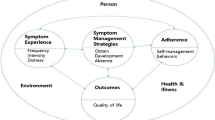Abstract
Patients referred for hematopoietic stem cell transplantation (HSCT) often have knowledge deficits about their disease and overestimate their prognosis making it difficult initially to discuss potentially life-threatening transplant options. To determine patients' understanding of their disease and the adequacy of a 3-h consultation at our center, we developed a survey that measured perceived knowledge deficits of disease, prognosis, and emotional status before and after their initial consultation. Ninety nine consecutive eligible patients completed the survey. Although 76.7% claimed adequate information about their disease pre-HCST visit, 51.5 and 41.4% respectively lacked knowledge about their 1-year prognosis with and without any therapy. After the visit, 66.7% of the patients had obtained enough information to make an informed decision regarding HSCT versus 23.2% pre-visit, and a significant reduction in the need for further information was reported by 53.5% of patients (P<0.001). Patients were not overwhelmed or confused by the visit and there was a small but significant decrease in negative affect. Measures to increase patients understanding of their disease and its prognosis pre-HSCT consultation visit are warranted; however, a 3-h consultation visit provides the majority of patients with sufficient information to make an informed decision about the risk/benefit ratio of HSCT.
This is a preview of subscription content, access via your institution
Access options
Subscribe to this journal
Receive 12 print issues and online access
$259.00 per year
only $21.58 per issue
Buy this article
- Purchase on Springer Link
- Instant access to full article PDF
Prices may be subject to local taxes which are calculated during checkout



Similar content being viewed by others
References
Weeks JC, Cook EF, O'Day SJ, Peterson LM, Wenger N, Reding D et al. Relationship between cancer patients' predictions of prognosis and their treatment preferences. JAMA 1998; 279: 1709–1714.
Dermatis H, Lesko LM . Psychosocial correlates of physician–patient communication at time of informed consent for bone marrow transplantation. Cancer Invest 1991; 9: 621–628.
Andrykowski MA, Brady MJ, Greiner CB, Altmaier EM, Burish TG, Antin JH et al. Returning to normal following bone marrow transplantation: outcomes, expectations, and informed consent. Bone Marrow Transplant 1995; 15: 573–581.
Eidinger RN, Schapira DV . Cancer patients' insight into their treatment, prognosis, and unconventional therapies. Cancer 1984; 53: 2736–2740.
Lee SJ, Fairclough D, Antin JH, Weeks JC . Discrepancies between patient and physician estimates for the success of stem cell transplantation. JAMA 2001; 285: 1034–1038.
Singer DA, Donnelly MB, Messerschmidt GL . Informed consent for bone marrow transplantation: identification of relevant information by referring physicians. Bone Marrow Transplant 1990; 6: 431–437.
Jacoby LH, Maloy B, Cirenza E, Shelton W, Goggins T, Balint J . The basis of informed consent for BMT patients. Bone Marrow Transplant 1999; 23: 711–717.
Patenaude AF, Rappeport JM, Smith BR . The physician's influence on informed consent for bone marrow transplantation. Theor Med 1986; 7: 165–179.
Bichakjian C, Schwartz J, Wang T, Hall J, Johnson T, Biermann J . Melanoma information on the internet: often incomplete – a public health opportunity? J Clin Oncol 2002; 20: 134–141.
Berland G, Elliott M, Morales L, Algazy J, Kravitz R, Broder M et al. Health information on the internet: accessibility, quality, and readability in English and Spanish. JAMA 2001; 20: 2612–2621.
Hurley CL, Mumby PB, Di Iorio S, Stiff P . Gender and marital status predict depression and social support in bone marrow transplant patients. Annal Behav Med 2004; 27 (Suppl): S020.
Hurley CL, Mumby PB, Stiff PJ . Predictors of noncompliance autologous bone marrow transplant patients. J Psycho-Oncol 2005; 14 (Suppl 1): 45.
Author information
Authors and Affiliations
Corresponding author
Rights and permissions
About this article
Cite this article
Stiff, P., Miller, L., Mumby, P. et al. Patients' understanding of disease status and treatment plan at initial hematopoietic stem cell transplantation consultation. Bone Marrow Transplant 37, 479–484 (2006). https://doi.org/10.1038/sj.bmt.1705264
Received:
Revised:
Accepted:
Published:
Issue Date:
DOI: https://doi.org/10.1038/sj.bmt.1705264
Keywords
This article is cited by
-
A qualitative study on patients’ and their support persons’ preferences for receiving one longer consultation or two shorter consultations when being informed about allogeneic hematopoietic stem cell transplantation
BMC Health Services Research (2021)
-
Prognostic understanding, quality of life and mood in patients undergoing hematopoietic stem cell transplantation
Bone Marrow Transplantation (2015)
-
Is ‘informed consent’ an ‘understood consent’ in hematopoietic cell transplantation?
Bone Marrow Transplantation (2015)
-
Predictors of non-compliance in autologous hematopoietic SCT patients undergoing out-patient transplants
Bone Marrow Transplantation (2012)
-
Comparison of early quality of life outcomes in autologous and allogeneic transplant patients
Bone Marrow Transplantation (2012)



